Unexpected heroes: The boda boda riders leading war on digital child sex abuse
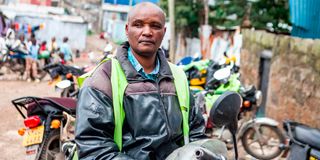
Francis Maina, the chairperson of the Soweto Boda Boda Association in Nairobi, during a training session on online child abuse in Kayole, Nairobi on April 29, 2024.
What you need to know:
- Boda boda riders, once accused of sexual harassment, are now at the forefront of combating online child sexual exploitation and abuse.
- Through various initiatives, these riders are being trained to identify at-risk children, educate communities, and report potential cases of abuse.
In the bustling streets of Nairobi and Mombasa, an unlikely group of champions has emerged in the fight against online child sexual exploitation and abuse (OCSEA).
Boda boda riders, once accused of perpetuating sexual harassment, are now at the forefront of protecting vulnerable youth from digital predators.
Early this year, Elly Kegode, a boda boda rider in Nairobi's Kawangware estate, received a distressing call from a young relative. The 19-year-old girl had been lured to Mombasa by a man she met on Facebook, only to find herself trapped in a nightmare of sexual abuse.
"She told me the man who had invited her to Mombasa was sexually abusing her. Two of the man's friends who lived with him were also sexually abusing her, in turns," Kegode recounts.
He guided her to escape, and upon her return to Nairobi, ensured she received medical attention and counselling.
This harrowing tale is not an isolated incident.
Eliud Wekesa, another boda boda rider from Kibra in Nairobi, shares a similar story about his 16-year-old daughter. After buying her a smartphone for studies, he was shocked to discover she was communicating with two different men on Facebook and TikTok, planning to meet them in Mombasa.
"When I took her phone, I was very shocked and lost for words when I followed the entire conversations that they were having in the two social media platforms and realised that the men had actually sent her Sh5,000 for her transport to Mombasa," Wekesa reveals.
These accounts mirror the experiences of countless unsuspecting girls across Kenya who have fallen victim to online predators.
The internet, while a powerful tool for education and connection, has also provided a sinister avenue for online child sexual exploitation and abuse (OCSEA).
A recent study conducted by Unicef, End Violence Against Children, and Interpol titled "Disrupting Harm in Kenya" sheds light on the alarming prevalence of OCSEA.

Suleiman Kombe a boda boda operator in Kayole during a training session on April 29, 2024.
Of the 1,014 internet-using children interviewed, two-thirds admitted to never having been taught about online safety. Fourteen per cent of children aged 12-17 had met someone face-to-face after first encountering them online in the past year, with six per cent sharing nude images or videos of themselves.
Most disturbingly, nine girls reported being subjected to sexual abuse and exploitation after meeting an offender in person following online contact.
Recognising the urgency of the situation, organisations like Child Fund have launched initiatives to combat OCSEA.
The Safe Community Linkages for Internet Child Safety (Safe Clics) Project, implemented in collaboration with Childline Kenya and LifeSkills Promoters, has engaged 1,800 boda boda riders across Nairobi, Kiambu, Kilifi, and Mombasa counties.
Disturbed by his relative's ordeal at the hands of online sex predators, Kegode decided to join the campaign that raises awareness against OCSEA. He was fortunate to receive training from Child Fund, an organisation championing child rights in Kenya and beyond.
We are keen to find out what the campaign entails and so, on a cloudy morning, we arrive at Bahati Secondary School hall in Soweto, Nairobi County. The air is thick with anticipation as we enter a packed room filled with boda boda riders from the area. At the front stands Kegode, his voice carrying authority and concern as he addresses the crowd.
He is leading a crucial education session on OCSEA. The riders listen intently as he outlines the various forms this insidious threat can take, from online grooming to sexual extortion and live streaming of abuse.
"As boda boda operators, we have a unique responsibility," Kegode emphasises.
"We must be vigilant protectors of the children we transport daily, especially young girls who are particularly vulnerable to these online predators."
The session goes beyond mere awareness. Kegode delves into the legal ramifications of OCSEA offenses, ensuring the riders understand the severity of these crimes in the eyes of the law.
He also provides valuable information on the remedies and support available to victims, empowering the riders to become not just transporters, but potential lifelines for children at risk. The attentiveness of the audience speaks volumes about the impact of this initiative.
These riders, once viewed with suspicion, are now being transformed into frontline defenders in the fight against online child exploitation.
Francis Maina, chairperson of the Soweto Boda Boda Association, notes that the initiative's impact has been significant, as evidenced by the many riders now involved. He explains that beyond targeting riders, they are also educating parents and children about OCSEA, its nature, and the dangers it poses.
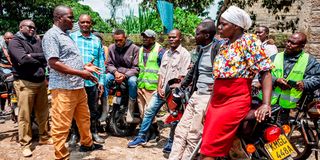
Boda boda operators and parents in Nairobi’s Kayole during a training session on April 29, 2024.
Beatrice Muema, Safe Clics’ project coordinator, explains, "The group is very paramount in taming cases of online sexual abuse. They have in the past been accused to contribute to sexual harassment and abuse, teenage pregnancies and insecurity but we are now changing the narrative. The operators are now our surveillance team on online sexual exploitation of girls."
In addition to engaging riders, the project works with 60 schools in Nairobi and Mombasa, training 120 peer educators to spread awareness among their classmates.
Child Fund Kenya Director Alice Anukur emphasises the importance of this multi-stakeholder approach: "We are working with different stakeholders to create awareness on the issue. The more the awareness the more our girls and children in general are safe."
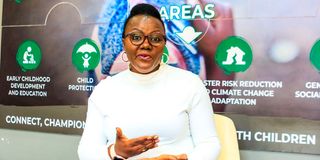
Child Fund Kenya's Alice Anukur during an interview in Nairobi on April 29, 2024.
The initiative has already shown promising results, with an increase in reported cases of online abuse and coordinated responses in areas where the project operates.
About 500km away in Bombolulu, Mombasa County, a similar initiative is unfolding among the boda boda riders.
On this sweltering morning, we visit the East African Pentecostal Church hall in Nyali. Despite the oppressive heat, the riders are fully engaged, their attention fixed on Joseph Akoth, an OCSEA champion and fellow boda boda rider. Occasional notes are jotted down in notebooks as the riders, undeterred by the scorching sun, demonstrate their commitment to learning about this emerging threat to their daughters' well-being.
Samuel Ogutu, the Mombasa County Boda Boda Operators chairperson, proudly states, "We hold two meetings every month to sensitise our members about OCSEA. We also use the various WhatsApp groups and other social media forums to amplify our campaign against this vice."
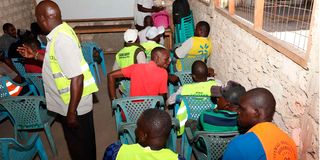
Nyali boda boda operators attend a training on protecting children rights and controlling child abuse within their sector in this photo taken on May 1, 2024.
The involvement of boda boda riders in this campaign has surprised many, given their previous reputation. However, their unique position in the community has proven invaluable in the fight against OCSEA.
John Ngugi, Childline Mombasa County Coordinator, notes, "The riders are involved in transportation of the girls when going to meet the perpetrators. Using them has helped us to nab many of these culprits."
Miriam Kimemia, a child rights activist in Mombasa, echoes this sentiment: "Boda boda operators are doing a commendable job and are our greatest asset as gender and human rights activists. They act as our informers and allies in this work."
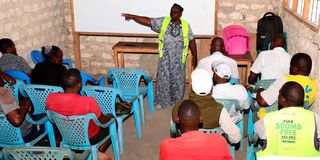
Miriam Kimemia, a child rights crusader from Mombasa addressing Nyali boda boda operators in this photo taken on May 1, 2024.
Thanks to the riders' intervention, numerous arrests have been made, and several cases of defilement are currently in court. Miriam says about 20 cases have resulted in convictions, with sentences ranging from 15 years to life imprisonment.
However, challenges remain, Miriam says. Poor evidence collection often leads to acquittals, and there's a need for more specialised personnel to handle OCSEA cases. The Anti-Human Trafficking and Child Protection Unit (AHTCPU), a specialised police unit, currently has only five OCSEA-focused officers.
In Nairobi, the project is currently being implemented in seven sub-counties namely, Starehe, Langata, Kibra, Embakasi West, Embakasi South, Embakasi Central and Embakasi South, and Kikuyu Sub-county in Kiambu County.
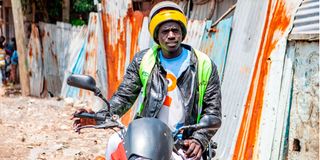
Sigumo Duncan a boda boda operator in Kayole during a training session on online child abuse conducted April 29, 2024.
In Mombasa, it is being undertaken in Likoni, Mvita, Changamwe, Kisauni, Nyali and Jomvu, and also in Kikambala which is in Kilifi County.
Kenya has taken steps to address OCSEA through national policies, including the National Plan of Action against Sexual Exploitation of Children in Kenya (2018-2022) and the National Information, Communications and Technology Policy (2019). However, these policies have yet to be widely disseminated or fully implemented.
For those seeking help or wishing to report cases of OCSEA, several channels are available. The Childline helpline 116 is a 24/7 toll-free phone service, offering online chat and SMS options for children to report abuse. Childline Kenya operates in partnership with the Department of Children's Services and works closely with the Directorate of Criminal Investigations and the AHTCPU.
Read also: Drive to shield women from abuse in matatus
As the digital landscape continues to evolve, so too must the efforts to protect Kenya's youth from online predators. By empowering unlikely heroes like boda boda riders and fostering open dialogue about online safety, the country is taking crucial steps to safeguard its children in the digital age.
“So far, we have about 50 cases of defilement in court, many of which have been a result of girls being lured online. A good number of these cases are as a result of intervention by the riders,” Miriam tells the nation.africa.





